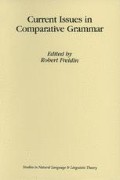Abstract
Minimality, the idea that government of an element can be blocked by an intervening governor, is simple and intuitively appealing; it is apparently of great utility in accounting for a wide variety of phenomena; and it has been very difficult to formulate in a manner that rules out all the relevant cases where government should be blocked while allowing government where necessary. The most influential version of minimality has been what Rizzi (1990) calls “rigid” minimality, by which an intervening head blocks government by any type of potential governor, regardless of category type. The central ECP-related proposal that Rizzi (1990) makes is to relativize minimality so that government is blocked only when competing governors match in some way, e.g., category level (X0 vs. XP) or A/A′ status. Before turning to Rizzi’s proposals, I will review briefly three earlier versions of minimality and the core phenomena which they have been adduced to account for so as to highlight the similarities and differences between Rizzi’s proposals and those which have come before. Two of these involve cases of heads blocking government by other heads, the other, Chomsky’s “rigid” minimality, involves heads blocking government by any potential governor.
Access this chapter
Tax calculation will be finalised at checkout
Purchases are for personal use only
Preview
Unable to display preview. Download preview PDF.
References
Aoun, J. and Y A. Li (1989) “Scope and Constituency,” Linguistic Inquiry 20, 141–172.
Baker, M. C. (1988), Incorporation: A Theory of Grammatical Function Changing, University of Chicago Press, Chicago.
Barss, A. (1986), Chains and Anaphoric Dependence: On Reconstruction and Its Implications, Doctoral dissertation, MIT, Cambridge, Massachusetts.
Browning, M. A. (1989), “ECP ≠ CED,” Linguistic Inquiry 20, 481–491.
Browning, M. A. (1991/1987), Null Operator Constructions, Garland Publishing, NY.
Chomsky, N. (1981), Lectures on Government and Binding, Foris, Dordrecht.
Chomsky, N. (1986a), Knowledge of Language, Praeger, New York.
Chomsky, N. (1986b), Barriers, MIT Press, Cambridge, Massachusetts.
Chomsky, N. (1991), “Some Notes on the Economy of Derivation and Representation,” in Principles and Parameters in Comparative Grammar, R. Freidin, ed., MIT Press, Cambridge, Massachusetts.
Cinque, G. (1989/forthcoming), “On the Scope of ‘Long’ and’ successive Cyclic’ Movement,” in this volume.
Fukui, N. and M. Speas (1986), “Specifiers and Projection,” ms.
Haïk, I. (1984), “Indirect Binding,” Linguistic Inquiry 15, 185–223.
Hornstein, N. and A. Weinberg (1981), “Case Theory and Preposition Stranding,” Linguistic Inquiry 12, 55–91.
Kayne, R. (1981), “ECP Extensions,” Linguistic Inquiry 12, 93–133.
Kayne, R. S. (1981), “On Certain Differences between French and English,” Linguistic Inquiry 12, 349–371.
Kitagawa, Y (1986), Subjects in Japanese and English, Doctoral Dissertation, University of Massachusetts at Amherst.
Koopman, H. and D. Sportiche (1988), “Subjects,” ms.
Lasnik, H. and M. Saito (1984), “On the Nature of Proper Government,” Linguistic Inquiry 15, 235–290.
Lasnik, H. and M. Saito (1992), Move α, MIT Press, Cambridge, Massachusetts.
Reuland, E. (1983), “Governing-ing,” Linguistic Inquiry 14, 101–136.
Rizzi, L. (1990), Relativized Minimality, MIT Press, Cambridge, Massachusetts.
Rizzi, L. and I. Roberts (1989), “Complex Inversion in French,” Probus 1, 1–30.
Rouveret, A. and J.-R. Vergnaud (1980), “Specifying Reference to the Subject: French Causatives and Conditions on Representations,” Linguistic Inquiry 11, 97–202.
Speas, M. (1990), “Incorporation Theory and the Mirror Principle,” in Proceedings of the Formal Linguistics Society of the Midwest.
Sportiche, D. (1988), “A Theory of Floating Quantifiers and Its Corollaries for Constituent Structure,” Linguistic Inquiry 19, 425–449.
Torrego, E. (1985), “untitled,” ms.
van Riemsdijk, H. (1978), A Case Study in Syntactic Markedness, Foris, Dordrecht.
Editor information
Editors and Affiliations
Rights and permissions
Copyright information
© 1996 Kluwer Academic Publishers
About this chapter
Cite this chapter
Browning, M.A. (1996). Comments on Relativized Minimality. In: Freidin, R. (eds) Current Issues in Comparative Grammar. Studies in Natural Language and Linguistic Theory, vol 35. Springer, Dordrecht. https://doi.org/10.1007/978-94-009-0135-3_10
Download citation
DOI: https://doi.org/10.1007/978-94-009-0135-3_10
Publisher Name: Springer, Dordrecht
Print ISBN: 978-0-7923-3779-9
Online ISBN: 978-94-009-0135-3
eBook Packages: Springer Book Archive

